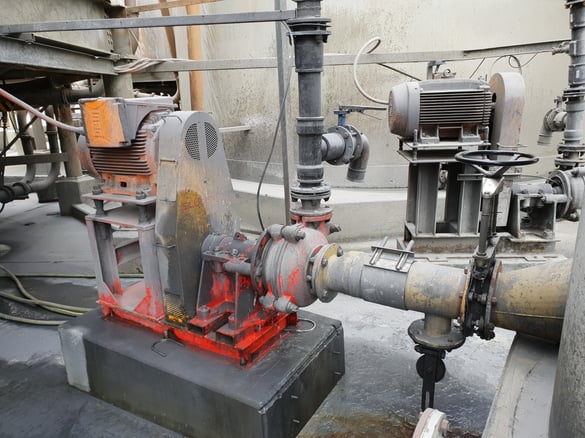A dead-headed pump is a pump that is running while full of liquid, with the outlet valves closed.
 Above: SlurryPro centrifugal pump onsite at mine site
Above: SlurryPro centrifugal pump onsite at mine site
What is dead-heading a pump?
A dead-head is caused when a centrifugal pump operates with no flow through the pump due to a closed discharge valve or blockage in the line. The pump is forced to circulate the pumped medium, causing the temperature to continually rise. As the fluid churns inside the pump it heats into a vapor. Once a vapor is created, any bushings or mechanical seals in the pump heat to the point that they begin to crack, shatter, score or compromise the elastomers - killing the pump.
When a centrifugal pump is dead-heading, it can lead to explosions, due to the energy being put into the liquid in the pump. Hydraulic overpressure and possible chemical reactions in the pump can also be caused by the overexertion of pressure.
The same results can be caused by running the pump dry for an extended period - which can lead to cavitation.
Why is it hard to detect a dead-head?
Due to the water levels not reducing during a dead-head scenario, a water level sensor will not detect if dead-heading is occurring. Therefore, pumps need to be installed with a temperature or a flow measuring device.
How to detect when dead-heading occurs?
Pumps should be installed with a temperature device on the casing or a flow measuring on discharge line to detect and alarm and shut off the pump.
It is possible to dead head a centrifugal pump for a very short time. No manufacturer will put time limit on this as every installation is different and they will not want to be held accountable if a failure occurs.
A positive displacement pump such as a peristaltic hose pump or helical rotor pump should never run against a closed valve. It is always recommended to install a pressure relief valve in this instance.
Our Global Pumps team have over forty-years’ experience working with clients in all industry’s and for multiple application. When it comes to preventative maintenance - our team can advise you on best practice to ensure dead-heading or other pump failure scenarios are less likely to occur.

